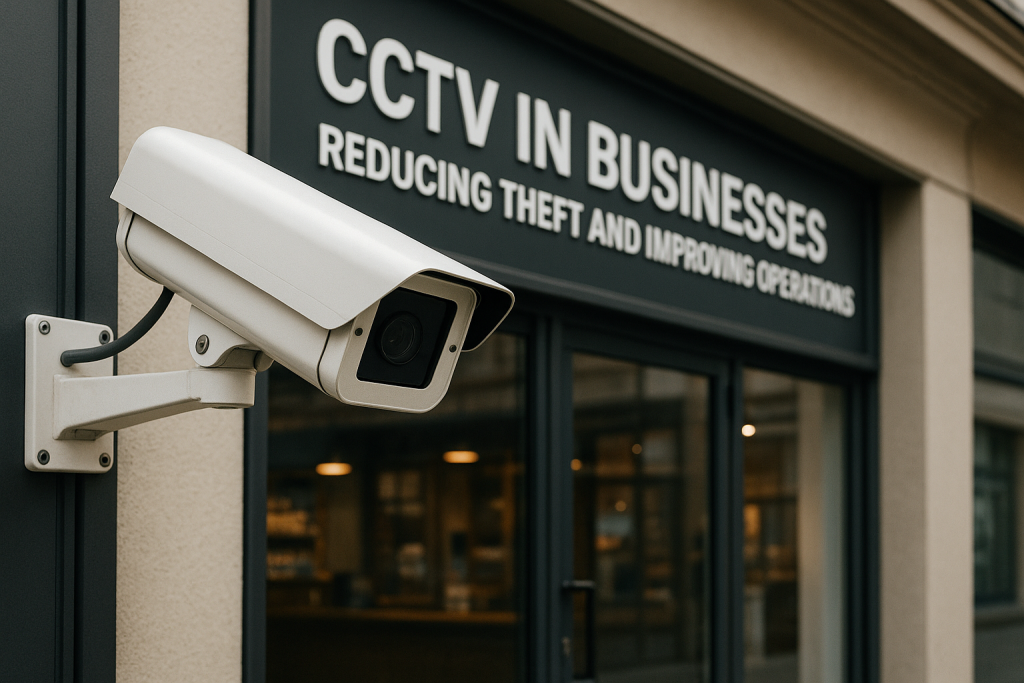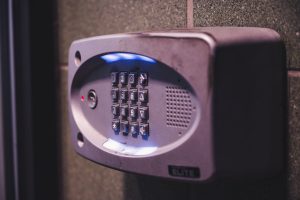Introduction
CCTV in Businesses: Reducing Theft and Improving Operations
Closed-Circuit Television (CCTV) systems have become a cornerstone of modern business security. Initially developed as a way to enhance public safety, CCTV has evolved into an essential tool for businesses of all sizes and sectors. Whether it’s a retail shop, warehouse, restaurant, office complex, or manufacturing facility, CCTV systems play a critical role in reducing theft, deterring criminal activity, and streamlining business operations. This article provides an in-depth look at how CCTV contributes to these benefits and why it remains a smart investment for business owners.
I. The Growing Need for CCTV in the Business World
1.1 Rising Security Threats
Businesses today face a wide range of security threats — from external criminal activities like burglary and vandalism to internal threats such as employee theft and data breaches. According to various security industry studies, a significant percentage of revenue loss in businesses can be attributed to theft, both internal and external. Retail businesses are especially vulnerable, with shoplifting and employee theft accounting for billions in annual losses globally.
1.2 Compliance and Liability
Regulatory compliance and liability issues are also on the rise. In many industries, surveillance is not just a precaution but a regulatory requirement. Video evidence can be crucial in legal disputes, workplace accidents, and insurance claims, often serving as the decisive factor in investigations.
II. Reducing Theft: The Primary Motivation
2.1 Dissuading Criminal Activity
The mere presence of visible CCTV cameras acts as a deterrent to potential thieves. Criminals are far less likely to target businesses that have visible security infrastructure in place. Surveillance systems create a psychological barrier, signaling that illegal activity will likely be recorded and prosecuted.
2.2 Monitoring Customer Behavior
Retailers benefit greatly from monitoring customer behavior. Surveillance can help identify suspicious behavior patterns, such as loitering, bag switching, or excessive visits to blind spots. These insights enable security personnel to respond in real time, often preventing theft before it occurs.
2.3 Internal Theft Prevention
While most businesses focus on external threats, internal theft remains a major issue. Employees with access to merchandise, data, or cash may engage in dishonest behavior. CCTV acts as both a deterrent and a tool for evidence collection in such cases. When employees are aware that they are being monitored, instances of theft and misconduct tend to decline significantly.
2.4 Inventory and Asset Protection
CCTV helps ensure that inventory and equipment are being handled appropriately. In warehouses and logistics centers, cameras can be used to verify loading and unloading procedures, reducing the chances of lost or stolen goods.
III. Improving Operational Efficiency
3.1 Workflow Monitoring
Beyond security, CCTV provides valuable insights into day-to-day business operations. Managers can review footage to analyze workflows, identify bottlenecks, and improve staff performance. For example, in manufacturing facilities, video analytics can help optimize assembly line productivity by pinpointing areas of delay.
3.2 Customer Service Improvement
In retail and hospitality settings, CCTV can be used to monitor customer service standards. Managers can assess how employees interact with customers and identify areas for training and improvement. Surveillance can also help in understanding peak business hours and customer traffic flow, enabling better staffing and resource allocation.
3.3 Ensuring Safety Compliance
In industries like construction, manufacturing, and food production, adherence to safety protocols is critical. CCTV allows supervisors to monitor safety compliance in real time, reducing the likelihood of accidents and improving accountability. When accidents do occur, video footage provides a clear record for analysis and future prevention strategies.
3.4 Remote Monitoring
Modern CCTV systems often come with cloud integration and mobile access, allowing business owners and managers to monitor multiple locations remotely. This flexibility is especially useful for businesses with multiple branches or franchises. It enhances oversight and facilitates quicker response times in emergencies.
IV. Legal and Ethical Considerations
4.1 Privacy Concerns
While CCTV can significantly benefit business operations, it must be used responsibly. In many jurisdictions, there are legal restrictions on where cameras can be placed — for example, in restrooms or changing rooms. It is also essential to inform employees and customers that they are under surveillance, typically through visible signage.
4.2 Data Protection
Footage recorded by CCTV systems is subject to data protection laws. Businesses must ensure that recordings are stored securely, accessed only by authorized personnel, and retained only for as long as necessary. Failure to comply can lead to heavy fines and reputational damage.
4.3 Ethical Use
It is important to balance surveillance with trust. Excessive monitoring can create a toxic work environment and erode employee morale. Employers should use CCTV as a tool for safety and improvement, not as a means to intimidate or micromanage staff.
V. Technological Advancements in CCTV
5.1 High-Definition and 4K Cameras
Modern CCTV cameras offer high-resolution video, providing clear images that can be used as evidence in investigations. Features such as zoom, motion detection, and night vision have also become standard.
5.2 Smart CCTV and AI Integration
Artificial Intelligence (AI) is transforming CCTV systems. Smart cameras can now analyze video feeds in real time, detecting unusual behavior, counting people, recognizing faces, and even identifying license plates. These capabilities automate surveillance and reduce the need for constant human monitoring.
5.3 Cloud-Based Systems
Cloud integration allows for scalable storage, remote access, and secure data backup. Businesses can avoid the limitations of traditional DVR systems and gain more flexibility in managing their video data.
5.4 Integration with Other Systems
CCTV can now be integrated with other security and operational systems such as access control, alarm systems, and point-of-sale terminals. This interconnected approach allows businesses to centralize their monitoring and enhance overall efficiency.
VI. Choosing the Right CCTV System for Your Business
6.1 Assess Your Needs
Not all businesses have the same surveillance needs. A small retail store may require a few cameras at entry points and cash registers, while a large warehouse might need a comprehensive system with hundreds of cameras and advanced analytics.
6.2 Consider Your Budget
While cost is a factor, CCTV should be viewed as a long-term investment. High-quality systems may require more upfront capital but deliver better results and lower maintenance costs over time.
6.3 Professional Installation vs. DIY
While some small businesses may opt for DIY CCTV installation, professional installation ensures proper camera placement, optimal coverage, and secure system setup. Professionals also provide ongoing maintenance and technical support.
VII. Real-World Case Studies
7.1 Retail Chain Theft Reduction
A regional clothing store chain experienced a 30% drop in inventory shrinkage after installing a smart CCTV system integrated with their POS terminals. The cameras helped identify both shoplifting incidents and employee fraud at the checkout counters.
7.2 Manufacturing Efficiency Boost
A mid-sized manufacturing plant used surveillance footage to analyze production lines. By reviewing the videos, they identified inefficiencies in material handling, which led to a 12% increase in production output after reconfiguring workflows.
7.3 Restaurant Staff Monitoring
A fast-food franchise implemented CCTV to monitor cleanliness and order accuracy. Management used the footage to train staff, resolve customer disputes, and ensure that food safety standards were consistently met.
VIII. Conclusion
CCTV systems are far more than security tools — they are multifunctional assets that can drive efficiency, accountability, and growth within a business. Whether your goal is to prevent theft, monitor employee performance, or ensure regulatory compliance, a well-designed CCTV setup can provide unmatched visibility into your operations.
As surveillance technology continues to evolve, the integration of AI, cloud computing, and smart analytics will make CCTV systems even more powerful and indispensable for modern businesses. However, as with any powerful tool, its effectiveness depends on how it is implemented, maintained, and ethically used.
In today’s competitive and security-conscious business environment, investing in a robust CCTV system is not just a smart choice — it’s a strategic imperative.
Secure Your Home and Business with Garrison Alarms!
Experience unmatched safety with Garrison Alarms – your trusted partner in cutting-edge home and business security solutions. With over 35 years of experience, we offer expert installation, state-of-the-art technology, and personalized security strategies tailored to your unique needs.
Our Services Include:
- Home & Business Alarms: Maximize security with our advanced wired and wireless alarm systems.
- CCTV Systems: Protect your property with high-resolution, 4K HD, and color night vision cameras.
- Access Control: Secure your premises with keypad entry, biometric solutions, and more.
- Alarm Monitoring: 24/7 monitoring to ensure your safety and peace of mind.
Why Choose Garrison Alarms?
- Expert & Professional Service: Our licensed technicians provide top-notch installation and support.
- Customer Satisfaction: We prioritize your security and satisfaction with a focus on quality and reliability.
- Affordable Pricing: Get the best security solutions at competitive prices.
Get a FREE Quote Today! Visit Garrison Alarms or call us at 09 520 4875 to learn more and secure your property today!
Garrison Alarms – Your Safety, Our Priority





